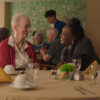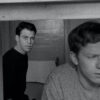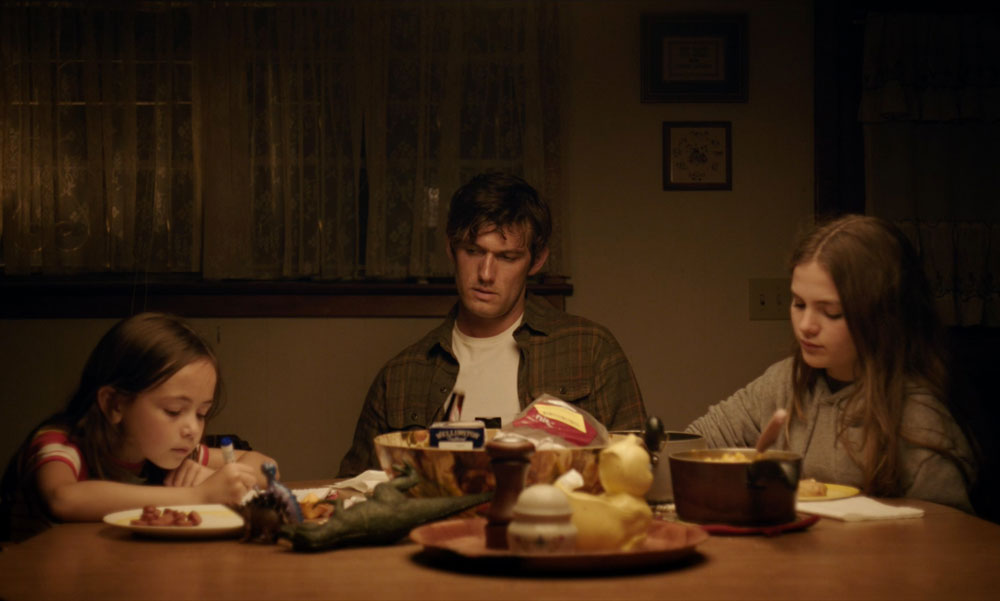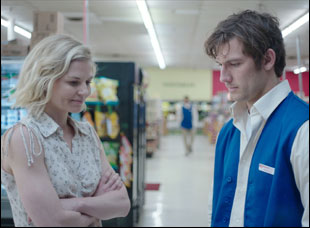A decade ago, Alex Pettyfer got the script to “Back Roads,” intrigued as any actor in his age range would be with the role of Harley Altmayer, an angry young man forced to take care of his three younger sisters after his mother is incarcerated for killing their father, tired of his abuse. The hothouse drama would’ve fit snugly between teen heartthrob roles in “Beastly” and “Endless Love,” as the adaptation of Tawni O’Dell’s one-time Oprah’s Book Club selection involves Harley developing a steamy relationship with his neighbor, but the production never came together as that type of film had fallen out of favor with studios and Pettyfer and the studios seemed slightly disenchanted with each other, leading the actor to broaden his horizons both in terms of the collaborators he looked for and the roles he could take on in a production.
The arrival of “Back Roads” now, with Pettyfer both in front of the camera and behind if for the first time as a director, suggests that while he was always the right person for the part, it was well worth the wait for him to take on Harley, no longer playing him as an innocent worried about his own prospects after being suddenly burdened by the unexpected responsibilities of serving as a surrogate father, but someone with enough life lived to fear he might be passing on the wrong lessons to his siblings when they can turn to no one else for guidance. While Pettyfer naturally plays Harley with unease, he shows a steady hand behind the camera and it’s easy to see why he had long been intrigued with the lurid thriller in which jealousy builds amongst all the women in Harley’s life, from his eldest sister Amber (Nicola Peltz) who craves the attention he gives to his neighbor Callie (Jennifer Morrison) to his younger sister Misty (Chiara Aurelia), the only one in the family to resent their mother (Juliette Lewis) depriving them of a father.
Whereas Pettyfer’s smoldering intensity once was deployed to seduce, it is subverted in “Back Roads” to reflect a desperate scramble to prevent Jody (Hala Finley), the youngest of Harley’s sisters from falling into the same cycle that has thrust the clan into such ongoing misery while trying to remain afloat himself as threats mount in every direction. Walking a fine line as a filmmaker as well, Pettyfer balances out the wicked plot twists of a script penned by no less than Adrian Lyne (“Fatal Attraction”) while wringing out a tender drama from untangling the tortured family ties. Following the film’s premiere at the Tribeca Film Festival earlier this year, “Back Roads” is now hitting theaters and streaming and Pettyfer spoke about his unexpected move into the director’s chair and the film’s decade-long journey to the screen as well as how acting could help him direct and assembling such a talented ensemble.
The fantastic Adrian Lyne had written the script and was going to direct when I first read it, but unfortunately, the film never got made. Ten years later, I had a small little bit of success producing and I had always had in the back of my mind that I wanted to see this script get made, so I approached the producer who still held the rights and told him my love for the film. I never wanted to be a part of it [as an actor] or to direct, but I wanted to help and try and get it made any way I could, and the producer, said, “Well, why don’t you be in it?” Then I had gone to two very high-profile directors who said they’d want to direct the film, but due to scheduling and then other circumstances, they couldn’t be a part of the film anymore, so I was left in this position of having this window of a couple months to make the film, otherwise I don’t think it would’ve been made.
So I presented a new draft of the script, which was still Adrian’s script – nothing rewritten, just downsizing the budget from what those A-list directors would’ve needed to [something with] less shooting days and gave a visual presentation. To my surprise, the financiers and the other producer who had the script for a long time really trusted me and gave me the opportunity to take a crack at directing the film, so it wasn’t planned or sought after. It was a real organic process and I feel very lucky, [especially because] I never thought that I would get the cast that I did. I was really so fortunate to be able to get people like Juliette Lewis and Jennifer Morrison.
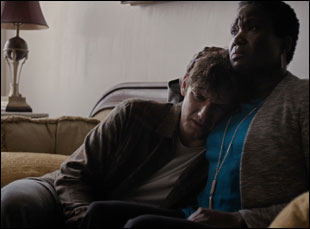
Yeah, if you watch the film, you can see there definitely things that I’ve taken from Soderbergh and from Lauren [Wolkstein] and Chris [Radcliff] in “The Strange Ones.” Steven, and Lauren and Chris in some ways, shoots very European and I think that just comes down to not so much stylistic [considerations], but cost and I think when Steven makes those movies like “Magic Mike” or “Girlfriend Experience,” you are put into this corner financially to make these films, but it’s liberating because you’re doing things that you wouldn’t normally necessarily do if you were on a big budget film [where] obviously you’d have the freedom to get coverage and as much footage as you’d possibly need. When you don’t have that, you’re limited to the choices that you have and what makes sense to you. I had lunch with a director the other day and he was telling me that he spent two or three hours doing this running shot and it just wasn’t working. They only had 30 minutes to get the shot of the actress in a laundromat and the light had gone and they didn’t have the lights to set up, but what happened is she ended up being a silhouette and he said it ended up being one of the most beautiful shots in the film. It was purely accidental, but I think those limitations create [happy] accidents.
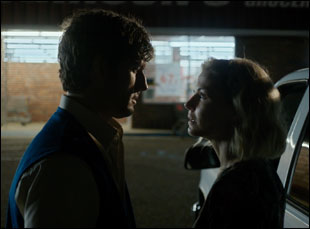
No, you know what I found is that you come from a real singular perspective when you’re an actor and when you’re directing, you’re looking at a multitude of different perspectives so your understanding of the film is so much greater. I thought it would be difficult to be in the scene and then leave and disconnect [to] be a director, but when you’re just solely directing – I found this in the scenes that I wasn’t in – you’re really watching from an outside perspective and it felt very strange and when you’re in the scene as an actor, you can tell if something works or not, other than if the camera is set up. Two or three times when I was just sitting in the video village, I felt disconnected from the actors. That’s why I understand that directors go into the scene and talk to their actors and try to want to feel like they’re in there in that moment. There was obviously the emotional stress of playing the character, but I found it easier when I was in the scenes to direct the film and the team that I had around me was fantastic, even down to Jennifer Morrison, who had directed her movie “Sun Dogs” before me.
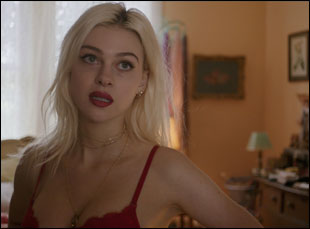
I learned working with Lauren and Chris and Steven Soderbergh and a couple other directors I had worked with that to give guidance has to be the most minimalistic advice because really when you’re an actor, it’s the sporadic nature of not knowing what you’re going to do that is the key to getting great performances, especially in “Back Roads” because they’re [mostly] one takes. The performances are key because they become like theater, so what I learned is to speak to the actors as much as I could before going on set and then when we were on set, it’s their job to do what they need to do. And that’s why they’re so great.
I mean, to get Juliette Lewis and Jennifer Morrison and Robert Patrick and June [Carryl], who played Betty – they’re phenomenal and my relationship with [that character of] Betty, when I was going through the script and budgeting it out, there was a draft when I cut Betty out because the composition of that [role of Harley’s therapist] in the film could come across self-explanatory. But even though he’s explaining what’s going on in the film, the understanding and also the humanity between Harley and Betty, that was a real surprise to me, that relationship that formed. I can’t explain how blessed I was to have had their support.
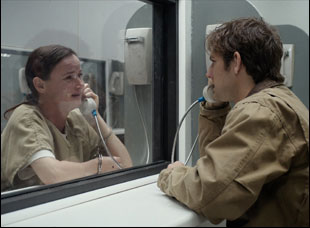
With the budget, it was a real stretch, but I think the day that I worked with Juliette [in] the scene that she and I did in the prison on our own, that was one take and we didn’t do another. We did the scene in the morning with Hala Finley, who plays my sister Jody and her daughter, and I had scheduled two days for [Juliette] because I thought the scene in the cafeteria would take a day and the other one would take a day and I just wanted to give some room to her. We knocked out the first scene in the cafeteria with Jodie in the first four hours and we had two hours left and I said to Juliette, “would you like to go to lunch and relax? Or would you like to carry on in that mindset and go and do the other scene? It’s one shot. I’m not doing coverage because it’s a stylized take.” And she thought about it for five minutes and said, “Let’s go for it.” So we went for it.
There were some real complications with hearing [Juliette] through the glass and this was before we even rolled, we put in earphones to try to hear [each other]. I couldn’t hear her and she couldn’t hear me and finally hers worked and mine didn’t, but I said, “Let’s just go for this.” And to do that shot is so technically difficult because it’s basically rolls in from a two to an over and then it pulls back into a two again, watching [my character] go out into a wide. It put a lot of pressure on Jarin [Blaschke, the cinematographer] who was operating and Calvin [Ursin Jr.], who was our grip who basically pushed the dolly in. We did the whole scene and I came outside and I looked towards the video village and people were very emotional — they were crying — and to get Juliette out of [where she sat during the scene] takes about 10 minutes because she was in the prison and I was in the visitor section, so I watched the tape, which I think was around seven minutes, and I called to the [assistant director] that was standing with Juliette and called her over and said, “Bring her over.” I said, “I don’t need another take. I don’t even need a safety. I’ll have someone make a copy, but I think you should watch this and make sure you feel comfortable with that.” She watched it and she goes, “I don’t think we need to do it again,” and there was this real love between one another. I can’t explain when you have that connection and that magic. People like Fincher and Kubrick look for that one take in 70 and the gods shined down on me and gave it to me on my first take. That’s the one that’s in the movie.
“Back Roads” opens on December 7th in Los Angeles at the Monica Film Center. It is also available on iTunes, Amazon and Google Play.

